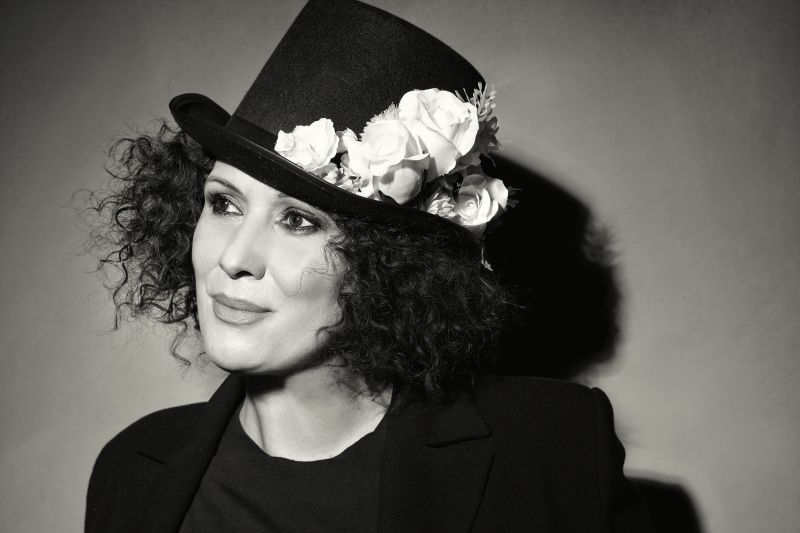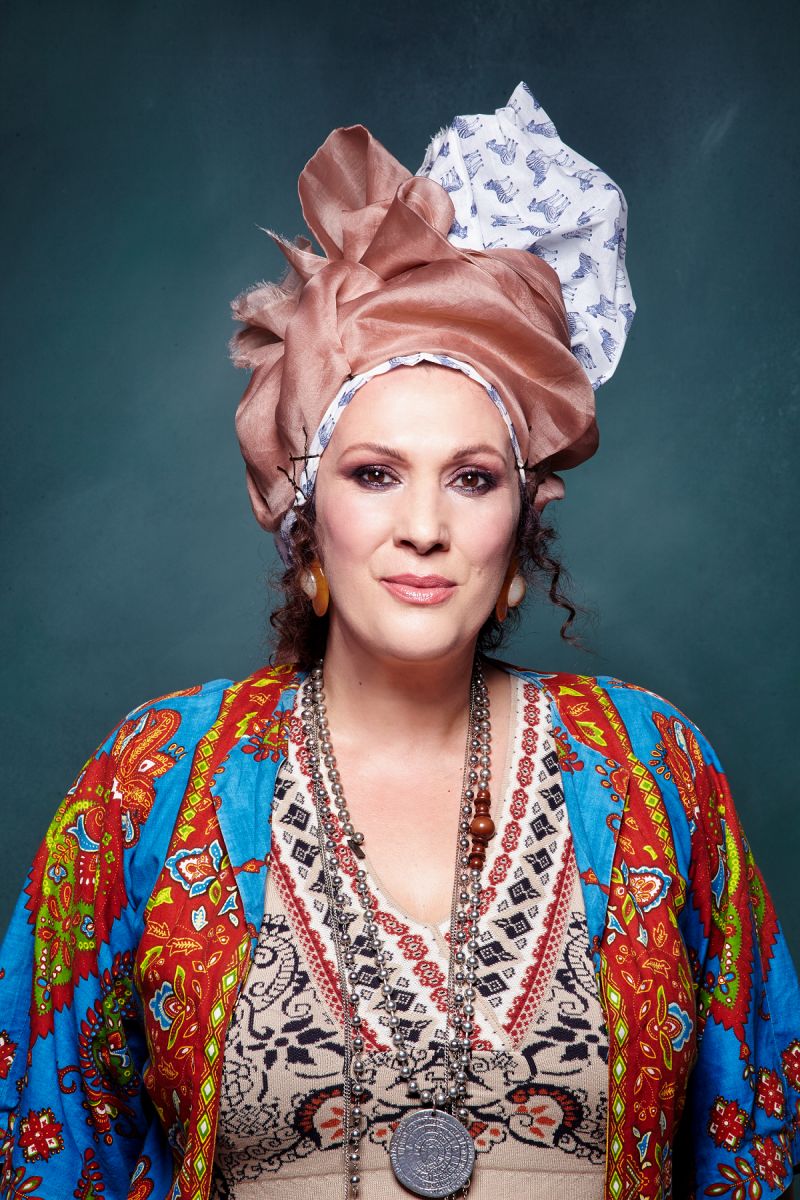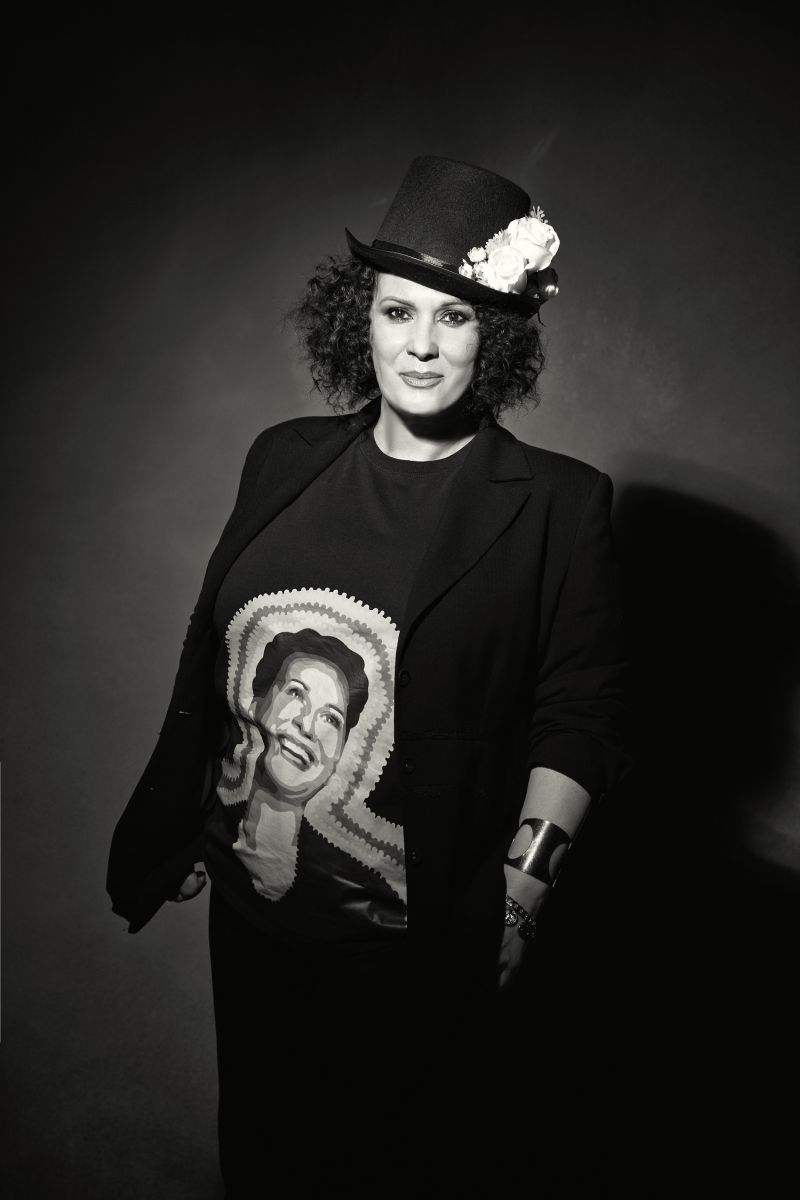Jelena Jovović was born in Beograd, Serbia, where she began to perform with various bands when she was just sixteen. She moved to Austria where she enrolled at the Graz Music University, where she studied with legendary vocalists Sheila Jordan, Mark Murphy and Andy Bey.

She became a mother with 21 and gradutated with honors. The war in former Yugoslavia brought her her husband and child to move to South Africa, where she soon started performing with the most influential musicians of the country’s jazz scene and became a Lecturer for jazz vocals f at the Cape town University and later at the Pretoria Jazz Faculty. She moved back to Europe in 2002, keeping performing internationaly with different bands as well with her own projects, and kept teaching in various jazz institiutions.
The perfect control of the instrument and extraordinary music culture allow Miss Jovovivic to approach different repertoires with an exceptional competency, giving to each song such a personal interpretation like only the great Jazz singers of the past could. Shes gifted by a stunning sound that together with her excellent phrasing and fabulous ryitmical proficiency enable her to sing the most demanding material with easiness and intensity.
Her stage presence and communicative both with the band and the audience has always conquered the heart and sould of the listeners, and made her a “musician’s musician”
- Jelena, when did you realize that jazz music is what you want to do in life? Was there a particular reason for choosing that call?
Music has always been part of my existence, and I discovered jazz in the early teens, as a sound that completely conquered my being. I do not know if there is a reason for it except that they are endlessly interesting harmonious valers and swinging like a pulse with which the tones just communicated with me on a mysterious level. My career of vocal solist developed at the end of the eighties and went through the pop-rock phase. At that moment there were no adequate educational institutions with a jazz curriculum in our country. It is only after I went to jazz music studies in Graz, that I acquainted with the real reasons and I had the opportunity to “drink water from the source” of the information. Although the time of the studies was colored by the war, the whole generation of ex Yugoslavs, who at the time were studying jazz music, chose this universal language in which we shared bread. Jazz music is, among other things, the reason for my travels around the world and the eternal search for the exchange, the need to improve myself as a musician and as a human being.

- Who, in your opinion, makes the audience of jazz scene in Serbia?
By the number of jazz festivals in Serbia, I can only notice that the audience, not only exists, but is constantly renewed and multiplied. To my joy, as a musician and pedagogue, it is also rejuvenated. By opening the Jazz Chair at the FMU, we got new quality and quantity when the scene is in question. I have to point out that there is a problem in media houses that allocate relatively little or no space for art music. An unorganized business segment in the absence of agencies that would place our music scene on new levels of action is also a topic worth paying attention to. We mainly import cultural content. I am not a witness to the systematic placement of them abroad, except in sporadic projects initiated by mostly the most brave artists. What I can notice for Belgrade is that there is a lack of world club culture in the form of a very significant silence while the concert program is being performed as well as the existence of a club instrument in the form of a piano or drum set that eases the process of tone rehearsal and overall tone image. I have to acknowledge the Belgrade Music Club “Soul Society” and the restaurant “Club of Writers”, and I believe that with their program policy, they will set the standard of business in this segment.
- You recorded your first studio album. How did you decide to do that, who supported you, did someone guide you through the process?
I knew this move would be a financially impossible mission for me as a mother and a pedagogue, and for years I have been holding this excuse. The fact that I performed with eminent musicians all over the world and without a solo album made me wonder, despite the general public’s astonishment that they can not buy one of my videos and that I will only remember them as an “excellent concert”. On the other hand, the record companies are directed to new, authorial material, and their classic jazz is an essential part of my iris – uninteresting for placement. Only the biggest stars in this business can afford it. So, I had to make the decision to try something new for me, to get away from the framework of this genre that was the basis for me. Fortunately, pedagogy constantly innovates me, new generations bring a new sound with me, and I let inspiration do my own. The creation has instigated the whole jazz tribe of local musicians. Each of them added his vision and put in music something special at gigs and concerts. I am endlessly grateful to everyone for this adventure because it contributed to layering and circled the story on the album.
At the insistence of my colleague and friend Katarina Kačunkovic, I applied for the SOKOJ cultural grant and I was given a sum that was a significant step in my decision to start the album. Inspired by the tradition of the Balkans, with the classic jazz sound, as well as a modern approach to harmony, the creative process in the form of recorded ten compositions on the album called Heartbeat was completed. The Dinar gene has led me to write all the texts, and the arrangements are an integral part of the process of creation of this genre. The texts are in English because we have the idea of placing the project abroad. My blessing on this album is the musicians who took part in it. Unsessed, witty, fantastic in their access to the material, they were a great support in the process of recording: Vasil Hadžimanov (piano), Milan Nikolic (double bass), Vladimir Kostadinovic (drums), Rastko Obradovic (saxophone) are the backbone of the album. Visiting musicians, each in their own way, painted and enhanced the basic idea of the song, and added a special seal to the sound, to give the example of the heat of the figehorna Stjepko Guta.
Of course, such a musical endeavor has to accompany the creation of consciousness about the artist and his work, and I thank the friends and the creative director of the project, Jelena Milisavac, and the whole team of beautiful ladies who are putting this album in public.

- You will promote the album at a concert financed by the Crowd Funding campaign. How did you come to the idea of collecting funds this way?
The album is published in the release of PGP RTS for the territory of Serbia, and our goal is to catapult Hertbeat into a new life outside the borders of our country. We also wanted to create the necessary promotional materials that should be accompanied by any representation of the work of the public, not only the promotion of extreme commercial artists.
Crowd funding phenomenon is becoming more and more popular, though, unfortunately not well known in our country. We heard of several positive examples in our environment and we were encouraged to try.
- Is there any advice that you would give to other artists who do not have the means to fund their projects?
If you have good ideas and a clear plan for realizing them, present them to the whole world through one of the crowd financing platforms. Crowd funding provides democratization in the field of project financing.
People around the world are your audience and potential support. If you can not convince sponsors in our country that your project is worth their attention, if representatives of state and local institutions, domestic and international foundations do not recognize the significance of your ideas, you can still search for the same people.
Present your project to the whole world through some of the cf platform, there are many. If your project prefers to use your message, idea, or originality, it will definitely find the way to people who want to support you financially. This is evidenced by figures on the amount of money collected this way each year, e.g. In 2015, about $ 35 billion was collected in this way around the world. The World Bank has presented its study on this subject, which predicts that by 2020, the annual inflow of money collected through the crowd financing platform will reach a figure of $ 96 billion.
On the link bellow, you can see HEARTBEAT: an exploration of Balkan jazz soul
https://www.indiegogo.com/projects/heartbeat-an-exploration-of-balkan-jazz-soul#/